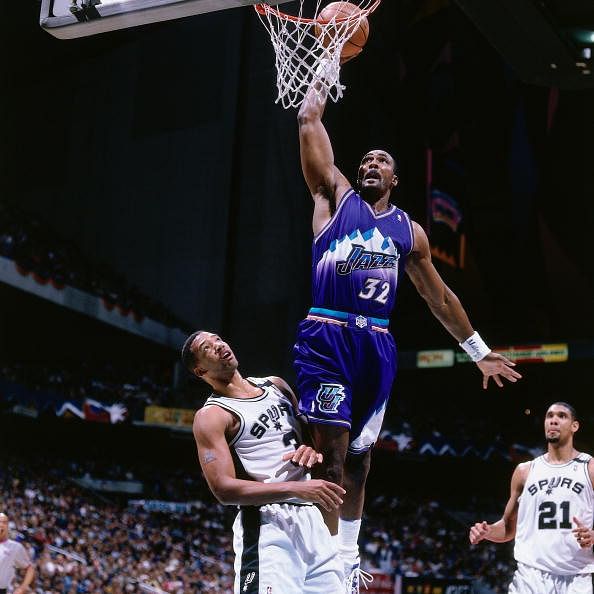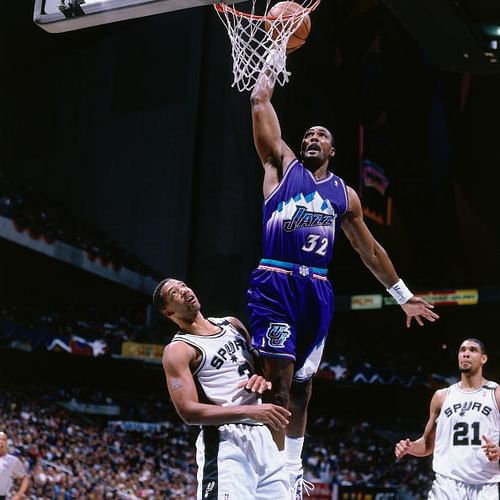
NBA's Top 10 Players of the 1990's: #9 Karl Malone - The toast of Salt Lake

Milkman: Karl Malone has his #32 retired by the Utah Jazz. (Getty Images)
At his enshrinement into the Naismith Hall-of-Fame in 2010, a proud Karl Malone, who graced the dais with his childhood hero, New York Knicks legend Willis Reed, thanked everyone for giving a shy kid from Louisville an opportunity to come this far.
As is custom with such august occasions, he made a few jokes, recalled some nostalgic memories, thanked his family, coach and teammates, and paid reverence to all the transcendent legends that made the Promised Land worthwhile.
In the regal company of dignitaries like John Stockton, Larry Bird, Magic Johnson, Charles Barkley and Jerry Sloan, he summed it up beautifully: “I hope I did it the way my peers did it before me. I didn’t do anything but try to play hard. I didn’t have a motive, because it wasn’t about me. It was never about me. It is about a lot of other people.”
And as he tried to carefully acknowledge everyone who mattered in his life, I couldn’t help but feel in awe of the man, almost apologetically acknowledging a player, who never got the recognition and the adulation he truly deserved.
Maybe the smaller fan base of Salt Lake played a factor. Maybe the fact that he was closest to dethroning Michael Jordan was another. Maybe his outrageously open-mouthed refusal to play with Magic Johnson after he had gone public with his HIV infection got him some more haters. And if these weren’t reasons enough, there were still some people who hated him for his physicality and nasty fouls on Isiah Thomas and Steve Nash.
Malone was the anti-superstar. He was not your poster boy or your white-collared polished player. He didn’t drive luxury cars but chose to ride a truck or a bike instead. Neither did he spend his days off holidaying in exotic locations; he was happier fishing on the bank or out hunting in the forests.
Malone didn’t care much about fashion either, as he strutted about wearing his signature cowboy hats and shoes. The hard-nosed man, he spoke his heart out unapologetically without any sense or regard for diplomacy, and was by no means anything close to the flash of a Jordan or a Barkley. He didn’t play for a city like Los Angeles (not in his prime at least) or a New York. To many, he was just the dark horse running a race, that nobody wanted him to feature in.
However, Malone did run the race, and ran it being himself, rather than adhering to the media’s definition of a star. And to defy all those who didn’t want him to get the distance, he worked that much more.
If there was anything that Malone prided himself on, it was the discipline and the effort that he undertook to prepare himself for each and every game. It was this work-ethic that saw him clock 18 seasons for the Jazz, while missing only SIX games due to illness or injury.
Malone’s work-ethic remained unmatched. Standing at 6’9” and 265 pounds, he was quick enough to run the floor with the quickest of guards, adroit enough to finish plays on the break, and strong enough to beat players on the post. He had a complete repertoire of moves, ranging from a fade-away jumper to a hook-shot. And quite like Bill Laimbeer, he played bigger than his size and would do anything to impose himself physically on the game.
If Malone felt like he needed to, he wouldn’t mind swinging the wild elbow, or getting in the face of opponents. He did it to the likes of David Robinson, Thomas, Tim Duncan and many more. To the fans, he dirty. To himself, he was just being bigger and imposing his will, as he famously stated, “Forget the technique. Hit the guy across from you. Don’t let somebody come in your space.”